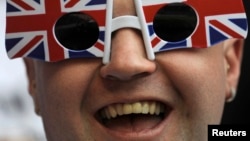Americans have long teased British people for having bad teeth, but a new study shows Americans actually have more dental problems.
Look no further than fictional British spy, Austin Powers’ jaundiced, toothy smile to get the picture.
"Contrary to popular belief, our study showed that the oral health of U.S. citizens is not better than the English," wrote the authors of the study, called "Austin Powers bites back."
Writing in the British Medical Journal, researchers from University College London, the National University of Colombia and the Harvard School of Public Health found that among those 25 and older, Americans are missing more teeth than their British counterparts.
The researchers said the stereotype of the gnarly-toothed Brit "dates back at least 100 years, with toothpaste advertisements extolling the virtues of American smiles."
The study also showed a socioeconomic difference between the two countries with poorer people in the U.S. having worse teeth than their British counterparts. Dental health in Britain is covered by the publicly funded National Health Service as opposed to the U.S. where dental insurance is the norm.
"Those in the lowest socioeconomic position levels tended to be better off in England," the study found.
The British press was ebullient about the news.
"Smile! American teeth worse than ours," read a headline in The Times.
The findings of the study shouldn’t be that surprising however.
In 2004, an OECD study of dental health found that Britain had the lowest number of people with decayed, missing or filled teeth from among all member states. The U.S. ranked in the middle.





